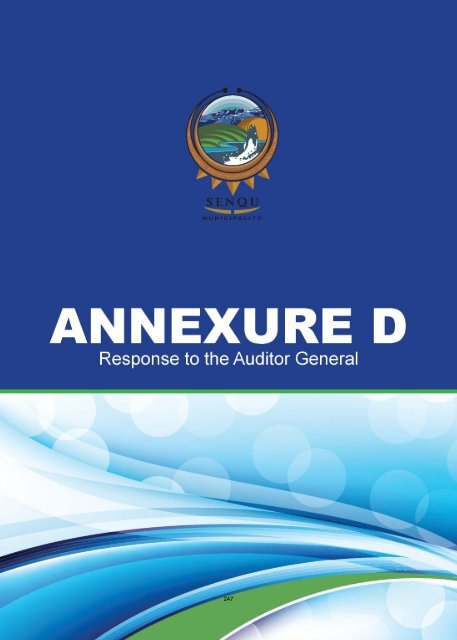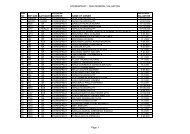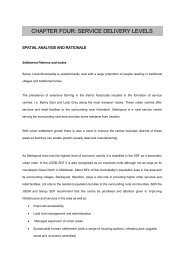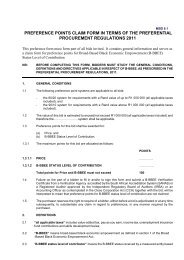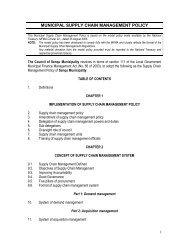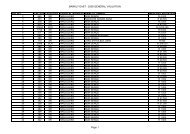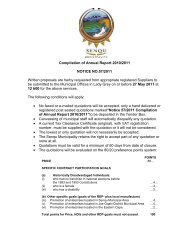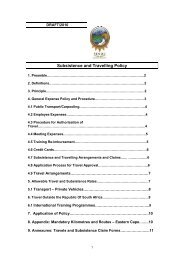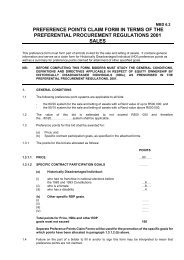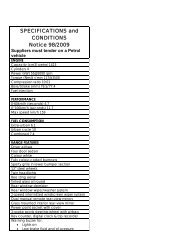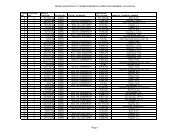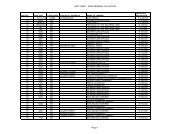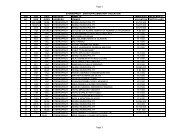annual report - part 2 chapter 4 annexure d - Senqumunicipality.co.za
annual report - part 2 chapter 4 annexure d - Senqumunicipality.co.za
annual report - part 2 chapter 4 annexure d - Senqumunicipality.co.za
Create successful ePaper yourself
Turn your PDF publications into a flip-book with our unique Google optimized e-Paper software.
SENQU MUNICIPALITY ANNUAL REPORT 2010/2011<br />
ANNEXURE<br />
D<br />
RESPONSE TO THE AUDITOR<br />
GENERAL<br />
247
SENQU MUNICIPALITY ANNUAL REPORT 2010/2011<br />
SENQU MUNICIPALITY: RESPONSE TO THE AUDITOR GENERAL’S<br />
REPORT 2010 - 2011<br />
The <strong>report</strong> which follows reflects Senqu Municipality‟s Response to the Auditor General Report on the Financial<br />
Statements for the year ended 30 June 2011.<br />
PURPOSE<br />
In terms of the Public Audit Act No. 25 of 2004 and s121 (3)(g) of the Municipal Finance Management Act, Act No. 56 of<br />
2003, it is required that the <strong>part</strong>iculars of any <strong>co</strong>rrective action taken or to be taken in response to issues raised in the<br />
audit <strong>report</strong>, be included in the <strong>annual</strong> <strong>report</strong> of the municipality.<br />
In responding to the Auditor-General‟s Report it must be noted that:<br />
Every reasonable and practical effort will be made to address the issues raised within the Audit Report and<br />
<strong>co</strong>mmitment is made to regard this as a matter of priority;<br />
Efforts made to address the deficiencies raised will be detailed through the development of an Audit Action Plan and<br />
these issues in the broadest sense will in<strong>co</strong>rporate issues relating to:<br />
o Internal <strong>co</strong>ntrols;<br />
o Legislative Compliance;<br />
o Management of data; and<br />
o Assignment of roles and responsibilities to ensure <strong>report</strong>ing <strong>co</strong>mpliance.<br />
INTRODUCTION AND SUMMARY<br />
Introduction<br />
It must be noted that the Audit Action Plan has been drafted in order to deal with the matters raised by the Auditor<br />
General‟s <strong>report</strong>. It is noted that a number of issues raised were similar to those raised within the 2009/2010 Audit<br />
Report. This <strong>report</strong> will detail general and specific issues raised within the Audit Report for 2010/2011, while reflecting<br />
briefly on issues raised during 2009/2010.<br />
Areas identified to be addressed<br />
During 2009/2010 the following broad issues were identified as issues to be addressed:<br />
Electricity losses;<br />
Unauthorized expenditure due to the failure of management to institute effective internal <strong>co</strong>ntrols;<br />
Fruitless and wasteful expenditure (due to distribution losses);<br />
Irregular expenditure (non-adherence to SCM processes and procedures);<br />
Late IDP submissions and a lack of performance targets;<br />
Performance agreements and performance evaluations of s57 managers not having been done;<br />
SDBIP not having been updated or approved timeously by the Mayor;<br />
Failure to provide a 3 year budget attached to the IDP;<br />
The municipal performance assessment not having been <strong>co</strong>mpleted timeously;<br />
The manner in which the SDBIP targets were formulated and objectives <strong>co</strong>ntained within the IDP had not been<br />
written specifically and in a measurable format. Additionally the SDBIP and budget were not aligned to the IDP.<br />
Baseline data was often missing and performance targets were in many instances reflected as percentages and<br />
had no specific time lines making it extremely difficult to measure and assess accurately. Performance targets<br />
therefor did not measure the efficiency, effectiveness, quality and impact of the performance of the municipality;<br />
Expenditure was not always paid within 30 days;<br />
Expenditure was not always made within the approved budget;<br />
Expenditure did not occur within the prescribed SCM prescriptions and instances of waste less and fruitless<br />
expenditure and irregular expenditure were in evidence; and<br />
Management oversight was required to be enhanced; and<br />
Compliance with all internal <strong>co</strong>ntrols required attention.<br />
After examination of the issues highlighted during 2010/2011 it is noted that a number of areas requiring attention during<br />
2009/2010 were not highlighted. By implication this would seem to indicate that these issues had been adequately<br />
addressed.<br />
248
SENQU MUNICIPALITY ANNUAL REPORT 2010/2011<br />
The following issues remain a cause for <strong>co</strong>ncern during 2010/2011 and appropriate action is required. These are<br />
detailed as follows:<br />
Electricity losses remain a challenge;<br />
There <strong>co</strong>ntinue to be cases of unauthorized expenditure due to the failure of management to institute effective<br />
internal <strong>co</strong>ntrols;<br />
Fruitless and wasteful expenditure and irregular expenditure while reduced, <strong>co</strong>ntinues to be an issue;<br />
Alignment of the SDBIP and Budget to the IDP remains a challenge;<br />
The quality and manner in which performance targets are worded (in all performance documentation) <strong>co</strong>ntinues<br />
to require attention. Performance targets are required to be written specifically and not simply presented as<br />
percentages;<br />
Baseline data is still required for many service delivery areas;<br />
The presentation, <strong>co</strong>nsistency of data and auditing of all performance information is required to be addressed<br />
and appropriate standards met; and<br />
Attention is required to be paid to ensuring <strong>co</strong>mpliance with basic timeframes that are legislated.<br />
GENERAL AREAS OF CONCERN<br />
More specific <strong>co</strong>mments in response to the Auditor General‟s Report are detailed in the main-body of this <strong>report</strong>, with<br />
specific reference to the numbering that appears within the Auditor-General’s Report (detailing the appropriate<br />
action that has or will be taken). It is therefore imperative that these <strong>report</strong>s are read together.<br />
It is noted that Senqu Municipality was awarded an unqualified audit opinion with emphasis of matter by the Auditor-<br />
General. The matters raised and the resultant action taken and/or planned by the municipality are reflected as follows:<br />
EMPHASIS OF MATTER<br />
Restatement of <strong>co</strong>rresponding figures<br />
8. As <strong>report</strong>ed, certain figures within the AFS were re-stated as a direct result of Directive 4 no longer being<br />
applicable. While this is acknowledged it is understood and accepted that this will no longer be an issue and<br />
<strong>co</strong>rrections will no longer be required moving forward.<br />
Material Losses<br />
9. Electricity losses amounting to R3 million and R4,1 million respectively will result in <strong>co</strong>ncerted efforts being<br />
made to reduce losses. A formal implementation plan with heightened <strong>co</strong>ntrols and monitoring will be developed<br />
and implemented ac<strong>co</strong>rdingly.<br />
Unauthorized Expenditure<br />
10. Plans will be put into place in order to reduce and eliminate unauthorized expenditure. This will involve a<br />
specific procedures to be followed and strict guidelines to be implemented on the manner in which expenditure<br />
is authorized (through SCM policy and procedure). Disciplinary action is to be taken in all instances where<br />
adherence to the policy and procedures does not occur and all related staff will be work shopped/kept informed<br />
of the latest developments and updates within these areas.<br />
REPORT ON OTHER LEGAL AND REGULATORY REQUIREMENTS<br />
Presentation of information<br />
14. While it is acknowledged that challenges were experienced in the alignment of the <strong>annual</strong> performance <strong>report</strong> to<br />
the SDBIP and Budget, it must also be acknowledged and understood that during the IDP review a number of<br />
discrepancies were identified between the information <strong>co</strong>ntained within the 2009/2010 IDP and the 2010/2011<br />
IDP. TheSDBIP‟s (Service Delivery Budget and Implementation Plans) and performance s<strong>co</strong>recards for both of<br />
these periods were in turn developed from these IDP‟s and discrepancies have in turn been carried forward as a<br />
result. For these reasons it is fair to <strong>co</strong>nclude that the development and population of performance targets and<br />
alignment of the SDBIP to the IDP/Budget and SDBIP <strong>report</strong>ing remains an intense challenge and this has in<br />
turn impacted on the quality of the <strong>annual</strong> performance <strong>report</strong> and its alignment to the SDBIP and IDP.<br />
We dispute the allegations that there were no satisfactory audit procedures that <strong>co</strong>uld be performed to obtain<br />
the required assurance as to the validity, accuracy and <strong>co</strong>mpleteness of the <strong>report</strong>ed performance against<br />
predetermined objectives. While challenges do exist, audit procedures have been created. Quarterly SDBIP<br />
<strong>report</strong>ing was <strong>co</strong>nducted and this reflected actual performance as against the planned performance targets.<br />
249
SENQU MUNICIPALITY ANNUAL REPORT 2010/2011<br />
Progress has been achieved in that: an Integrated Planning & Compliance Manager has been appointed; an<br />
Internal Auditor has been appointed; the Internal Audit Unit is functional; and an Internal Audit Plan was<br />
developed and approved by the Audit Committee. The role and function of this unit is to facilitate <strong>co</strong>mpliance in<br />
the manner in which <strong>report</strong>ing is <strong>co</strong>nducted and the manner in which policies and procedures are<br />
<strong>co</strong>nducted. Efforts are <strong>co</strong>ntinuously made to evaluate performance and functioning within de<strong>part</strong>ments and to<br />
advise them of important dates and on the type of <strong>report</strong>ing / information required from de<strong>part</strong>ments. This unit<br />
focuses on the facilitation of <strong>co</strong>mpliance issues.<br />
Notwithstanding these appointments and the units responsibility it is acknowledged that improvement overall is<br />
required and this is to a large extent necessitated by the need for management to treat these issues as a matter<br />
of priority, rather than an issue of <strong>co</strong>mpliance.<br />
Greater <strong>co</strong>ntrols will be instituted within the new financial year.<br />
Usefulness of information<br />
15. An element of weakness does exist in the degree of <strong>co</strong>nsistency between the objectives, indicators and targets<br />
between the planning and <strong>report</strong>ing documents. Special attention and auditing of these issues will take place<br />
with all future development of documents; and<br />
Greater attention will be paid to the manner in which targets and measures are defined in all planning<br />
documents so as to ensure that these are developed ac<strong>co</strong>rding to accepted SMART principles (i.e. these will be<br />
written to ensure that they meet the criteria of being: Specific, Measureable, Achievable, Realistic and Timebound).<br />
Reported Indicators are not <strong>co</strong>nsistent when <strong>co</strong>mpared with planned indicators (Consistency)<br />
16. Discrepancies between the 2009/2010 and 2010/2011 IDP‟s have impacted and <strong>co</strong>ntributed towards the issue<br />
of <strong>co</strong>nsistency between the SDBIP and IDP. With the development of the new 5 year IDP and improved<br />
measurements and targets, efforts to ensure <strong>co</strong>nsistency when developing the new SDBIP‟s will be greatly<br />
enhanced.<br />
Planned and <strong>report</strong>ed indicators are not verifiable (Measurability)<br />
17. Indicators for the new financial year will be written ac<strong>co</strong>rding to the SMART principles and percentages will only<br />
be used in instances where these are quantifiable and appropriate to the targets being measured. Baseline<br />
data will be captured wherever this is possible. In instances where this cannot be currently captured, steps will<br />
be put into place to ensure that this data is re<strong>co</strong>rded and will receive priority.<br />
Reliability of information<br />
18-19. In order to address the deficiencies raised regarding the validity, accuracy and <strong>co</strong>mpleteness of the performance<br />
information <strong>report</strong>ed, performance outputs will be clearly stated in the <strong>annual</strong> performance <strong>report</strong>. The manner<br />
in which targets are defined will be written ac<strong>co</strong>rding to the SMART principles and appropriate <strong>co</strong>ntrols to<br />
measure actual performance will facilitate <strong>report</strong>ing of performance outputs.<br />
COMPLIANCE WITH LAWS AND REGULATIONS<br />
Strategic and Performance Management<br />
20. The Ac<strong>co</strong>unting Officer is to be held ac<strong>co</strong>untable for the submission of the municipalities performance<br />
assessment during the first half of the financial year (to the Mayor, National Treasury and Provincial Treasury as<br />
per s72 (1)(b) of the MFMA). Managers are to be held ac<strong>co</strong>untable within all de<strong>part</strong>ments regarding<br />
performance <strong>report</strong>ing and failure to meet required timeframes will be strictly addressed. The role of the<br />
Ac<strong>co</strong>unting Officer in respect of the performance <strong>report</strong> is merely one of “<strong>co</strong>ordinator” and to <strong>report</strong> on<br />
ac<strong>co</strong>unting issues.<br />
Budget<br />
21. Strict adherence to the Supply Chain Management Policy and approved budget will occur and no overexpenditure<br />
will be <strong>co</strong>ndoned. Regular <strong>report</strong>ing is to be provided (monthly) and re<strong>co</strong>nciliations <strong>co</strong>nducted<br />
monthly.<br />
250
SENQU MUNICIPALITY ANNUAL REPORT 2010/2011<br />
Annual financial statements, performance and <strong>annual</strong> <strong>report</strong><br />
22. The <strong>annual</strong> financial statements are to be prepared with strict adherence to the requirements of s122 of the<br />
MFMA.<br />
23. The 2010/2011 Annual Report is to be tabled timeously to the Council by the Mayor (within seven months after<br />
the end of the financial year) as per s127(2) of the MFMA.<br />
24. The Mayor has provided the required written ac<strong>co</strong>unt detailing the reason for the late tabling / submission of the<br />
2009/2010 Annual Report as per s127(3) of the MFMA.<br />
25. The Annual Report will in future include the s46 <strong>report</strong> and will detail the performance of the municipality and of<br />
each external service provider (as per requirements of s46 of the MSA).<br />
Audit Committees<br />
26. The Performance Audit Committee will review the municipality‟s performance management system <strong>annual</strong>ly and<br />
make re<strong>co</strong>mmendations to Council in this regard as per the Municipal Planning and Performance Management<br />
Regulation 14.<br />
Procurement and <strong>co</strong>ntract management<br />
27. All aspects of the SCM Regulations (policy and procedure) with specific reference to s22 (1) and s22 (2) will be<br />
strictly adhered to (minimum periods for advertisements).<br />
28. Tighter <strong>co</strong>ntrols will be applied in order to ensure and ascertain that awards are not made to providers who are<br />
in the service of other state institutions or those that have directors/principle shareholders who are in the service<br />
of other state institutions. All service providers will be required to sign declarations to this effect.<br />
Expenditure management<br />
29. Systems and <strong>co</strong>ntrols will be developed and SCM training <strong>co</strong>nducted in order to ensure that no unauthorized,<br />
irregular or fruitless and wasteful expenditure occurs as per s62 (1) (d) of the MFMA.<br />
Revenue Management<br />
30. Revenue received will be re<strong>co</strong>nciled weekly as per s64(2)(h) of the MFMA.<br />
Asset management<br />
31. Council will be required to approve the disposal of assets register (as per the Municipal Assets Transfer<br />
Regulation). Management and staff will receive formal training on their responsibilities regarding the<br />
management of de<strong>part</strong>mental assets and the re<strong>co</strong>rding and <strong>report</strong>ing of any change to asset numbers and<br />
structure. Asset management and <strong>report</strong>ing is to be strictly <strong>co</strong>ntrolled and monitored.<br />
Strict adherence to the Asset Management Policy will be monitored and managed.<br />
INTERNAL CONTROL<br />
Leadership<br />
33. The Ac<strong>co</strong>unting Officer will be required to strictly monitor and <strong>report</strong> on the implementation of action plans to<br />
address internal <strong>co</strong>ntrols to ensure that assets are effectively managed and losses are effectively <strong>co</strong>ntrolled.<br />
Financial and performance management<br />
34. Controls over the daily and monthly processing and the re<strong>co</strong>nciliation of transactions will be strictly implemented<br />
and monitored by the Ac<strong>co</strong>unting Officer. Efforts to better align the IDP, Budget and SDBIP will be undertaken<br />
and this will positively influence performance <strong>report</strong>ing. Training/workshops will be presented on the practical<br />
application of the Performance Management Framework and this will ensure that appropriate staff are<br />
capacitated to apply the different aspects of individual and institutional performance management <strong>report</strong>ing and<br />
assessment.<br />
251
SENQU MUNICIPALITY ANNUAL REPORT 2010/2011<br />
Governance<br />
35. The Audit Committee will be effectively trained in as far as their roles and responsibilities are <strong>co</strong>ncerned. A<br />
certain amount of progress did occur (i.e.an Integrated Planning & Compliance Manager was appointed; an<br />
Internal Auditor was appointed; the Internal Audit Unit was functional; and an Internal Audit Plan was developed<br />
and approved by the Audit Committee. Notwithstanding it is acknowledged that greater oversight on the<br />
accuracy and <strong>co</strong>rrectness of the performance <strong>report</strong>s was required and this will be <strong>co</strong>rrected in the new financial<br />
year and treated as an area of priority.<br />
252
SENQU MUNICIPALITY ANNUAL REPORT 2010/2011<br />
REPORT OF THE AUDIT COMMITTEE TO THE EXECUTIVE COMMITTEE AND<br />
COUNCIL OF THE SENQU MUNICIPALITY<br />
We are pleased to present our <strong>report</strong> for the financial year ended 30 June 2011<br />
Audit Committee Members and Attendance<br />
The Audit Committee was established during 2004 and <strong>co</strong>nsists of the following members:<br />
Name of Member<br />
Number of Meetings attended for the financial year<br />
ended 30 June 2011<br />
Mr. D Du Plessis(Chairperson) 4<br />
Mr. G De Jager 4<br />
Mr. .J. Hattingh 4<br />
Audit Committee Responsibility<br />
The Audit Committee <strong>report</strong>s that it has adopted appropriate formal terms of reference via the Audit Committee Charter,<br />
which have been approved by the Municipal Manager.<br />
Evaluation of Annual Financial Statements<br />
These financial statements are prepared in ac<strong>co</strong>rdance with the basis of ac<strong>co</strong>unting determined by the National Treasury<br />
as set out in the ac<strong>co</strong>unting policy and in a manner required by the MFMA.<br />
The Audit Committee has:<br />
Reviewed and discussed the audited <strong>annual</strong> financial statements to be included in the <strong>annual</strong> <strong>report</strong> with the<br />
Auditor-General and Council;<br />
Reviewed the Auditor-General <strong>report</strong> and management‟s response thereto;<br />
Reviewed the selection of ac<strong>co</strong>unting policies and practices;<br />
Reviewed the effectiveness of the internal <strong>co</strong>ntrol systems;<br />
Reviewed the effectiveness of internal audit;<br />
Reviewed the risk areas of the Municipality‟s operations to be <strong>co</strong>vered in the s<strong>co</strong>pe of internal and external audits;<br />
Reviewed the adequacy, reliability and accuracy of financial information provided to management and other users of<br />
such information;<br />
Reviewed the ac<strong>co</strong>unting and auditing <strong>co</strong>ncerns identified as a result of internal and external audits;<br />
Reviewed the Municipality‟s <strong>co</strong>mpliance with legal and regulatory provisions;<br />
The activities of the internal audit function, including its <strong>annual</strong> work programme, <strong>co</strong>-ordination with the external<br />
auditors, the <strong>report</strong>s of significant investigations and the responses of management to specific re<strong>co</strong>mmendations.<br />
The Audit Committee <strong>co</strong>ncurs, accepts the Auditor General <strong>co</strong>nclusions on the <strong>annual</strong> financial statements, and is of the<br />
opinion that the audited <strong>annual</strong> financial statements be accepted and read together with the <strong>report</strong> of the Auditor-<br />
General.<br />
Performance Measurement<br />
The Audit Committee notes an improvement in the method of <strong>report</strong>ing the performance of the Municipality.<br />
Risk Management<br />
Whilst progress has been made in respect of the establishment of the risk management structure and framework, a risk<br />
management function and process has also been established and implemented for the year under review. The Risk<br />
Committee is acknowledged to be the Audit Committee in which risk management <strong>report</strong>s have been tabled. Facilitation<br />
of the strategic and operational risk assessments has been <strong>co</strong>nducted. Notwithstanding, it is acknowledge that there are<br />
253
SENQU MUNICIPALITY ANNUAL REPORT 2010/2011<br />
still areas where improvement in risk management is required and it is suggested that De<strong>part</strong>ment <strong>co</strong>nduct their own risk<br />
assessments and put in place the appropriate <strong>co</strong>ntrols within which to mitigate risk .<br />
Conclusion<br />
The Committee re<strong>co</strong>gnizes the unqualified audit opinion received by Senqu Municipality and wishes to place on re<strong>co</strong>rd<br />
their acknowledgement of this and the role that the Budget and Treasury De<strong>part</strong>ment played in these regard. Overall<br />
improvements were noted and it is appreciated that areas raised by the Auditor General under „‟emphasis of matter‟‟ will<br />
be addressed moving forward. The Audit Action plan represents a <strong>co</strong>mprehensive list of all details that are required to be<br />
attended to within the new financial year. Ensuring that Senqu Municipality moves forward in the strategized manner in<br />
order to optimize financial efficiency and <strong>co</strong>ntrols.<br />
Mr. D Du Plessis<br />
Chairperson of the Audit Committee<br />
254


